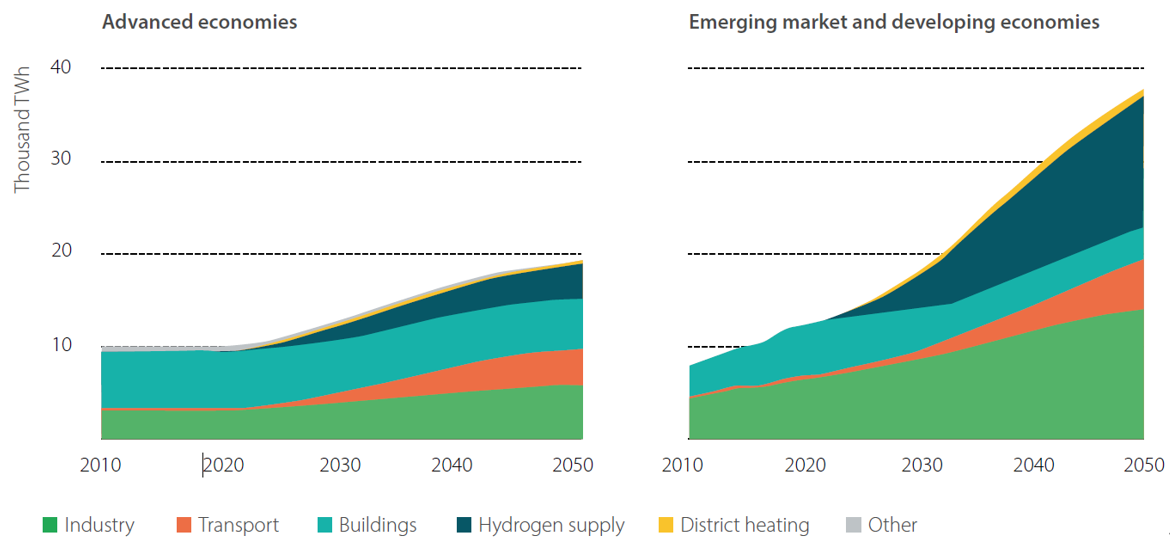This is a marketing communication.
“The era of global warming has ended; the era of global boiling has arrived.” Those were the words of United Nations Secretary-General António Guterres in a recent speech at the UN headquarters in New York City. And it has certainly been a chastening few years in terms of weather extremes, including wildfires, hurricanes and record-breaking heatwaves in Europe, Asia and North America. Formerly once-in-a-generation exceptional events now risk becoming alarmingly routine.
The financial risks of climate change
A 2022 report from the Deloitte Centre for Sustainable Progress suggested that “if left unchecked climate change could cost the global economy USD 178 trillion over the next 50 years, or a 7.6% cut to global gross domestic product (GDP) in the year 2070 alone”.
But there is still time to turn the tide. This need for immediate action is why we define climate change as an investment megatrend, and we believe Green and Sustainable Bonds have a vital role to play. We’ve long believed this and are pioneers in the Green Bond space. Alongside The World Bank in 2010, we launched the world’s first dedicated World Bank Green Bond Fund.
Helping brown industries turn green
Finding solutions to climate change will likely centre on innovation and technology advancement, and will therefore require significant funding. These efforts require research and development (R&D) funding. Green and Sustainable Bonds are structured like standard bonds, with the proceeds either applied exclusively to fund projects such as renewable energy projects, waste management, and other initiatives designed to promote sustainable practices or linked to a positive environmental change.
Within the Nikko AM Global Green Bond team, we have a particular focus on companies in the traditional and developed industries—those that actually contribute most to the carbon output. This is, in part, because they can most help to move the needle in terms of the transition to net zero. These high-carbon emitting “brown” industries are often excluded from sustainable finance markets. Yet, by definition, these industries harbour the lion’s share of potential for CO2 emission reductions and often do not yet have substitutes (such as steel, aluminium and cement industries). We therefore believe it is crucial to support these industries in their transition, while pursuing the integrity and stringent requirements that the climate emergency demands.
We believe that investing in this space is going to have a significant impact in transitioning these traditional brown industries from being climate negative to being climate positive. Tax incentives, such as the Inflation Reduction Act in the US, are expected to have a significant impact in terms of meeting net zero targets by helping these traditional brown industries re-adjust.
How investment can support net zero targets
In the transition to net zero, the focus is on impact and engagement. We are actively engaged in the global fixed income markets, and support green and sustainable investments in the transition towards overall sustainability in order to meet net zero targets. We are particularly trying to focus on those companies with ambitious targets for net zero and carbon reduction.
Fixed income provides a unique opportunity, especially in Green and Sustainable Bonds, as they enable direct impact. For example, electricity generation is a critical area of focus due to its high impact on global carbon output and IEA forecasts suggest electricity consumption is going to double or perhaps quadruple over the next 30 years. Therefore, providing capital to enable the transition to green and renewable power sources is critical. Much of the capital needed for that expansion is going to come from the debt markets so picking and choosing the utility providers that have ambitious targets is going to be key.
Chart 1: Electricity demand by sector and regional grouping

Source: IEA
To learn more sustainable fixed income investing, read Nikko AM’s investment guide here.
If you have any questions on this report, please contact:
Nikko AM team in Europe
Email: This email address is being protected from spambots. You need JavaScript enabled to view it.



